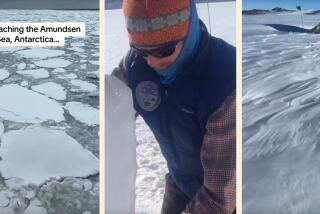Expedition to Probe Oceanâs Effect on Weather : Research: Scripps scientists to gather clues from the Pacific in hopes of unlocking the mysteries of global warming, <i> El Nino </i> and changing weather patterns.
A ship moored at Point Loma embarks early today for the far reaches of the Pacific, its crew members, many from the Scripps Institution of Oceanography, in search of what one scientist calls âpieces of a giant puzzle.â
When completed, the puzzle may yield answers to global warming, El Nino and radically changing weather patterns throughout the world.
Todayâs expedition is part of the World Ocean Circulation Experiment, or WOCE, which, in the United States alone, is costing more than $100 million. Lynne Talley, associate professor of oceanography at Scripps, says this is the first such mission to study the Pacific.
âWith the entire experiment, with all of WOCE--which started last year and will go on for 10 years--we hope to map ocean circulation, surface to bottom, throughout the world,â Talley said.
Twelve scientists from Scripps, which is part of UC San Diego, will leave on the outbound ship and be gone 120 days, covering more than 14,000 miles. Scripps researchers will collect thousands of water samples, measuring temperature and salinity continuously.
Talley said the samples will reveal the oceanâs chemical properties and be used as sources of data for defining the circulation of shallow and deep ocean currents.
Scripps scientists say the worldâs oceans absorb energy from the sun, transport it in meandering currents and release it into the atmosphere at times and places far removed. The process influences the atmospheric circulation of heat and moisture, as well as the distribution of greenhouse gases, thus shaping the worldâs weather.
Talley said that to grasp the âoverall cycles of the ocean-atmosphere system, we need global data collected throughout the 1990s to compare to large studies conducted in the â50s and â70s, because then you get a chance to see seasonal and inter-annual changes in ocean conditions.â
She said the mission will sail first to Monterey, then to the central North Pacific and south past Tahiti before stopping in Hawaii in September. She said the full group includes 22 scientists and 23 crew members to handle the craft.
James H. Swift, an associate research oceanographer at Scripps, leaves on another WOCE cruise, scheduled to embark from San Diego on July 16 and return Aug. 26. Swift said much of the work on such a cruise is routine and time-consuming, but pleasant.
âNo telephones,â he said.
Swift said the research is handled in 12-hour watches each day, seven days a week, with no one taking a break. He said each scientistâs work is minute in terms of the overall goals of the project, which reaches completion step by agonizing step.
âThe ships are involved in gaining knowledge in the state of the oceans in the 1990s, in terms of climatic and global changes,â Swift said. âEach piece is one piece of a giant puzzle, no less or more important than any other piece.
âTo study the state of the ocean as it exists right now, well, itâs never been attempted before on such a systematic and global basis. The motive for the mission is partly climate and global changes.
âThe oceans are to some extent the flywheel on the climate of the world. The oceans hold a vast amount of heat in storage. They help to modulate or moderate atmospheric fluctuations,â Swift said.
Information gained from the expeditions, over the course of the next decade, will help to âmore accurately predict and understand the Earthâs climate,â according to Swift.
He said some of the information may offer further insight into El Nino , although thatâs hardly the sole reason for any mission. Other data will offer clues about global warming and its effect on the worldâs weather.
âHere we are, messing with the whole climate of the world,â Swift said. âNo doubt, weâre messing with it. The evidence may not be there yet, but you canât add carbon dioxide and methane and Freon without changing something.
âIt seems wise to begin to understand what weâre doing, so that, somehow, we can make predictions and adjust. Itâs a poor policy among the governments of the world if we institute massive (technological) changes without being virtually certain that itâs the right thing to do.
âCertainly,â Swift continued, âthe government needs more information. What weâre doing isnât applied science, itâs basic science. Weâre trying to understand how oceans contribute to climate systems, in the hope of getting specific enough to make climate predictions based on relatively sparse observations. We donât know where weâre headed, and there are a lot of things we need to do.â
Edward A. Frieman, the director of Scripps, said: âThere is a new urgency to know more precisely than ever before the details of where ocean waters flow, how quickly they mix into the ocean depths, and their role in distributing heat around the globe.â
He added, âthe tremendous amount of data that WOCE will produce will be a giant step toward understanding the ocean as a global entity and learning how it influences the atmosphere and climate change.â
Funding for the U.S. portion comes from the National Science Foundation. The 10-year international effort, which involves scientists from 40 nations in what Scripps officials say is the largest scientific effort ever attempted in the worldâs oceans, is funded largely by UNESCOâs World Climate Research Program.
Scripps researchers concede that funding is now a conversational topic, especially at UCSD, where a $295-million shortfall predicted by state budget officials may mean the loss of dozens of programs, services and staff members.
Talley said state cuts donât affect the WOCE program, âbut they do affect the number of faculty and staff positions, and, in the long term, they threaten to weaken the institution. They are having some effect now.
âThere is an early-retirement program,â she said, âand Scripps is counting on some of that to help with the budget crunch. Itâs definitely slowing down faculty hiring. Most of us are more affected by grants in our federal budget. Weâre taking cuts there too. As an institution, weâre definitely affected by all of this. In a lot of ways, it is an uncertain time.â






